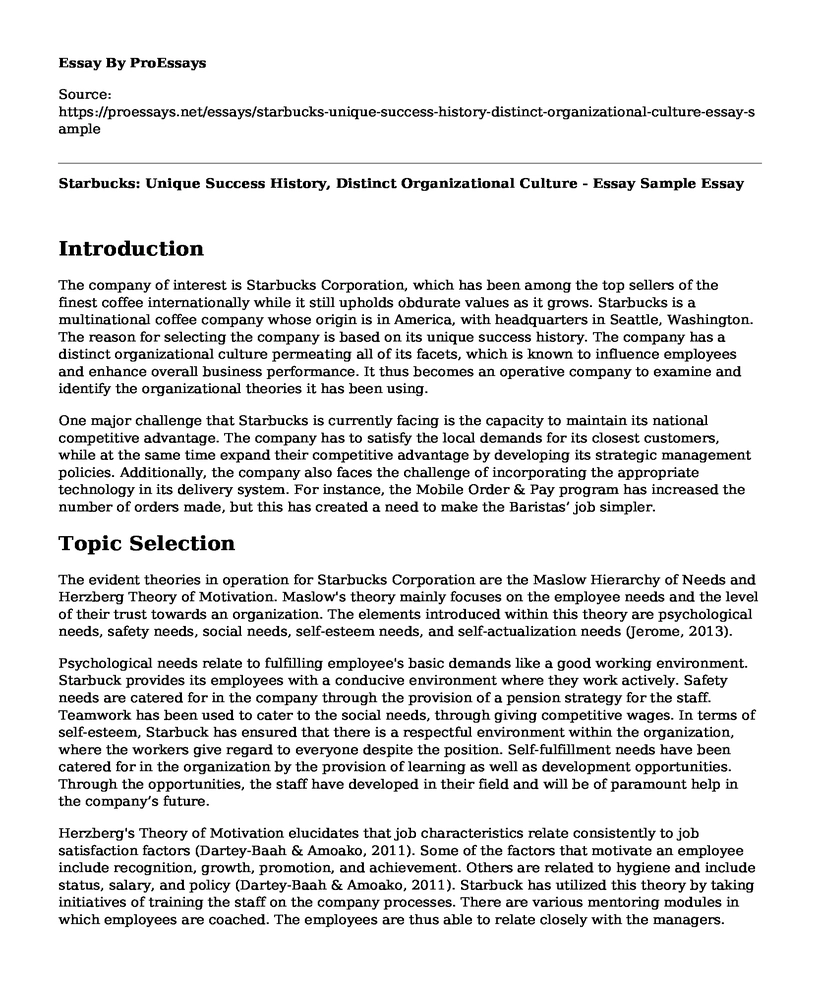Introduction
The company of interest is Starbucks Corporation, which has been among the top sellers of the finest coffee internationally while it still upholds obdurate values as it grows. Starbucks is a multinational coffee company whose origin is in America, with headquarters in Seattle, Washington. The reason for selecting the company is based on its unique success history. The company has a distinct organizational culture permeating all of its facets, which is known to influence employees and enhance overall business performance. It thus becomes an operative company to examine and identify the organizational theories it has been using.
One major challenge that Starbucks is currently facing is the capacity to maintain its national competitive advantage. The company has to satisfy the local demands for its closest customers, while at the same time expand their competitive advantage by developing its strategic management policies. Additionally, the company also faces the challenge of incorporating the appropriate technology in its delivery system. For instance, the Mobile Order & Pay program has increased the number of orders made, but this has created a need to make the Baristas’ job simpler.
Topic Selection
The evident theories in operation for Starbucks Corporation are the Maslow Hierarchy of Needs and Herzberg Theory of Motivation. Maslow's theory mainly focuses on the employee needs and the level of their trust towards an organization. The elements introduced within this theory are psychological needs, safety needs, social needs, self-esteem needs, and self-actualization needs (Jerome, 2013).
Psychological needs relate to fulfilling employee's basic demands like a good working environment. Starbuck provides its employees with a conducive environment where they work actively. Safety needs are catered for in the company through the provision of a pension strategy for the staff. Teamwork has been used to cater to the social needs, through giving competitive wages. In terms of self-esteem, Starbuck has ensured that there is a respectful environment within the organization, where the workers give regard to everyone despite the position. Self-fulfillment needs have been catered for in the organization by the provision of learning as well as development opportunities. Through the opportunities, the staff have developed in their field and will be of paramount help in the company’s future.
Herzberg's Theory of Motivation elucidates that job characteristics relate consistently to job satisfaction factors (Dartey-Baah & Amoako, 2011). Some of the factors that motivate an employee include recognition, growth, promotion, and achievement. Others are related to hygiene and include status, salary, and policy (Dartey-Baah & Amoako, 2011). Starbuck has utilized this theory by taking initiatives of training the staff on the company processes. There are various mentoring modules in which employees are coached. The employees are thus able to relate closely with the managers.
Academic Research
The first source used is an international journal of business and management, which, through an empirical study, examines the application of Maslow’s hierarchy of need theory (Jerome, 2013). The article examines the implications and the relevance of the theory on organizational culture, human resource management, and employee performance and how it is applied in the attainment of results to realize organizational goals and objectives. The second source discusses the application of Herzberg’s Two-Factor theory. It also involves an empirical study of how the theory is essential in the workplace and its application (Dartey-Baah & Amoako, 2011).
Personal Reflection
The organizational strategies that Starbuck utilizes in its operations relate to my own learning as well as organizational setting in a number of ways. First, being a student mentor, motivation is a major tool I use to encourage and inspire students. Secondly, through motivation, for instance, when I get a good grade in a course, I find myself learning with vigor and tenacity because of the inspiration from the achievement. Eventually, the achievement from other areas improves too. On many occasions, I find Herzberg's Theory of Motivation in operation; for example, when I get recognized, the zeal increases to work harder in a given setting. When I worked in fast food restaurant, I realized too that in many cases, Maslow’s Theory of needs was in operation mostly when we could be assigned a task to accomplish via the team or group work. The outcomes were always distinct and better as compared to when working on the same alone. The reason could be based on the social needs that are addressed through teamwork. Additionally, when the management introduced competitive wages, I was able to earn more and felt more motivated because I felt that my needs were met.
References
Dartey-Baah, K., & Amoako, G. K. (2011). Application of Frederick Herzberg’s Two-Factor theory in assessing and understanding employee motivation at work: a Ghanaian Perspective. European Journal of Business and Management, 3(9), 1-8.
http://www.academia.edu/download/30917447/535.pdf
Jerome, N. (2013). Application of Maslow's hierarchy of need theory; impacts and implications on organizational culture, human resource, and employee's performance. International Journal of Business and Management Invention, 2(3), 39-45.
https://www.academia.edu/download/37416838/Applications_of_Maslows_theory.pdf
Cite this page
Starbucks: Unique Success History, Distinct Organizational Culture - Essay Sample. (2023, Aug 10). Retrieved from https://proessays.net/essays/starbucks-unique-success-history-distinct-organizational-culture-essay-sample
If you are the original author of this essay and no longer wish to have it published on the ProEssays website, please click below to request its removal:
- Total Quality Management
- Role of Leadership in Change Management
- Ron Ventura: Case Study with Report Writing
- Factors Connecting the Employee Efficiency and Need for Training Paper Example
- A Change Management Perspective and Impact of Information Technology on Customer Service
- Paper Example on Organizational Culture: Its Impact on Workplace Norms & Behaviour
- Paper Sample on Test Reliability and Validity: Ensuring Accurate Results







